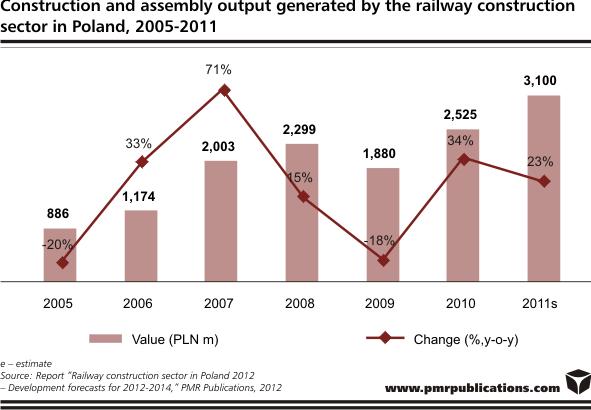The condition of rail tracks in Poland is deplorable due to two decades of neglect of investment. Thanks to the generous funds provided by the European Union the Polish railway sector has embarked on a difficult path towards restoring its infrastructure, which creates opportunities for growth in new segments of civil engineering construction.
As a result of intensified implementation of projects contracted in the previous years, the value of the railway construction market grew by more than one-fifth to around PLN 3.1bn (€750m) in 2011, according to PMR’s report entitled “Railway construction sector in Poland 2012 – Development forecasts for 2012-2014”. Though this amount is the highest on record for the railway construction industry, it will be surpassed in the 2012-2013 period.
All the major projects from the current EU perspective are already under way or are just about to be started. The highest-value projects concern the following three transport corridors: the Warsaw-Gdansk link (line E65), which will be continued until the spring of 2014, the Rzeszow-Krakow-Katowice-Zabrze link (line E30) where the bulk of construction of work is due for completion at the beginning of 2015, and partial upgrade of the Warsaw-Lodz railway line including the reconstruction of the Lodz Fabryczna railway station (this project is expected to be ready in the spring of 2015). Delivery dates for investment projects co-financed by the European Union are binding because their implementation and financial settlement must be completed in 2015. Otherwise, the projects will lose the funding, whose aggregate value amounts to around PLN 9.5bn (€2.3bn).
More investment projects co-financed by the European Union are expected to commence in 2012 and 2013, though their scope will be more limited and time frame will be specifically defined. Consequently, the value of the projects slated for the period will be lower. The end of the current EU perspective will be marked by pronounced significance of investment projects financed using PKP’s internally-generated funds and funds from the central budget.
An initial summary of investment projects has been also defined for the 2014-2020 perspective, which contractors in the railway sector believe to be even better than the present one. These contracts include both already prepared projects, which are completely unlikely to be implemented by 2013 due to delays, and those for which preparation work is performed now or will be performed shortly. The largest tenders will include proceedings concerning the Lublin-Otwock line and work on the Sadowne-Bialystok section as part of the Rail Baltica line. The highest-value investment projects planned in the western regions of the country will be the Szczecin-Poznan line, as well as conclusion of the work on the Poznan-Wroclaw and Wroclaw-Klodzko lines. The aggregate value of projects announced by PKP PLK for the years 2014-2020 exceeds PLN 30bn (€7.3bn). Therefore, despite the expected contracts for the construction of the Fast Speed Rail system, the railway construction market has bright prospects in this decade.
“Whether this ambitious schedule is feasible is an open question. It is by now evident that not all the tasks earmarked for 2007-2013 will be completed. It is highly likely that more projects will be delayed; furthermore, some tasks will be completely abandoned. However, it is only to be hoped that PKP PLK will enter the next financial perspective with a larger number of prepared projects and their implementation will be undertaken without any major delays, as widely expected by the potential contractors”, says Katarzyna Bednarz, a PMR construction analyst and the author of the report.
This press release is based on information contained in the latest PMR report entitled “Railway construction sector in Poland 2012 – Development forecasts for 2012-2014”.
Latest Events News
- NordBau 2024: Construction machinery, construction equipment, commercial vehicles in construction and a Northern European congress on housing construction and heating transition
- INTERMAT 2024: the low carbon theme also at the heart of the show to improve its environmental performance
- Liebherr’s R 972 crawler excavator presented at the Intermat show
- Volvo moves to zero with decarbonization showcase at Intermat 2024
- Komatsu at Intermat 2024
